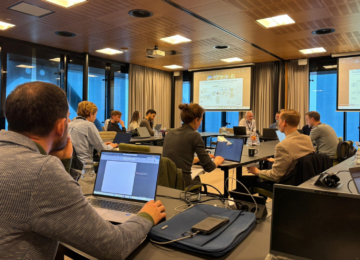Interview Pieter Grinwis (ChristenUnie) - Energy storage needs to be managed more.
The Lower House elections are just around the corner and Energy Storage NL is curious to see how energy storage is included in the party programs of various political parties. The run-up to the elections is at Energy Storage NL on "energy storage in politics. For this campaign, we interviewed several members of parliament about what they think is the importance of energy storage in the energy system. With this time the word: Pieter Grinwis, MP and spokesman for Energy and Climate for the Christian Union.
What do you think is the main added value of energy storage in the energy system, in the short and long term? And how do you see the role of storage within the energy system itself?
Our energy system is changing rapidly. More solar and wind energy is constantly being added, leading to a more volatile system. That requires flexibility. You can try to organize that flexibility on the demand side, but because of the size of the peaks and troughs, that is not enough. You will have to integrate flexibility solutions into the system itself. Think of controllable power, preferably CO₂-free. Until now, that has often been natural gas and biomass, but if we want to move to more sustainable alternatives, you quickly end up with storage.
Storage is thus an important tool in providing that flexibility. You can also see from TenneT's security of supply reports that flexibility is becoming more important every day. Although there is policy for flexibility, Dutch policy is now hardly focused on the rapid scaling up of storage. That worries me. Because I am convinced of the added value of storage, I am surprised that the policy is so wait-and-see - especially at the Ministry of Climate and Energy (KGG), where in my view they are too conservative.
You mentioned that in the long term there is a clear need for storage because of the growth of solar and wind. At the same time, in the short term we see grid congestion as an increasing bottleneck. What role do you see for energy storage in counteracting grid congestion, and do you think this potential is currently being adequately exploited?
No, I think too little is happening with that yet. Developments in storage technology are moving at lightning speed, as are cost reductions. That makes it all the more urgent that policy moves with them, but that is not happening. You now see home batteries becoming more popular, and neighborhood or district batteries can also help alleviate grid congestion at the local level. But larger storage systems can also play a big role in generation.
What surprised me: on the generation side, the minister sees the value of storage in case of grid congestion, but not on the off-take side. I asked written questions about that a year ago. The answers were disappointing. Policy lags behind technological reality. It is important that the ministry and its advisers include the speed of innovation in their proposals, including on this topic. That is not happening enough now. And that then also inhibits policy responses to my proposals to give storage a better place in the system.
What do you think is the main reason that the development and integration of storage is still lagging behind in the Netherlands?
The big showstopper is grid tariffs. They are too high and do not take sufficient account of the added value of storage in the energy system. It has been calculated many times: a battery, if used properly, absorbs peaks in generation as well as in prices. That reduces the need for extra capacity from solar and wind. But then you have to have the courage to turn the knob on network tariffs.
Therein lies immediately the problem: The minister is bound to the Consumer & Market Authority (ACM). And I sometimes jokingly say: the ACM is the most powerful political party in the Netherlands. Their interpretation of European rules is leading. Even if we make proposals that are in line with the policies of neighboring countries such as Belgium or Germany, the ACM sticks to its own reading. As a result, little happens here, while storage initiatives just across the border do get off the ground.
The 65% discount now introduced is a first step, but on the economical side. Compared to the Belgians and Germans, it is not enough. So yes, the key word is net tariffs, but also the attitude of the ACM is playing tricks on us.
You advocate for more government direction. How do you assess the current storage strategy and what do you think should be improved?
I understand that the ministry is reluctant to focus on specific technology. That fits in with a neoliberal tradition in which you try to remain technology-neutral and mainly let the market determine. But we are in a transition. And in a time of energy transition, it is sometimes necessary to steer temporarily in order to gain momentum.
On the generation side, we've been doing that for years. We make choices for solar, wind, nuclear. But further down the energy system we remain cautious. That doesn't make sense to me. We also need control over flexibility, and thus storage. I would argue for intermediate targets - provisional storage targets on which you make policy as a government. That helps enormously to ensure long-term security of energy supply.
What do you think it takes to go from "think is important" to true priority?
It starts with political will. In our election program, we will explicitly mention the importance of storage. I also submit motions, ask questions, and try to find Chamber majorities. This is getting better and better. But it's slow going. And in the meantime, we are missing out on investment decisions. Still, I am not pessimistic: I see movement at the ministry and also at the ACM.
It would, of course, be best if the minister himself actively directs storage. That would be most effective. But until that happens, it is up to me and my colleagues, through the Chamber, to get that storage tanker moving.
What can we expect from the Christian Union on storage in the run-up to the election?
We will emphasize that an energy system with more and more solar and wind also requires flexibility. And that includes policies, including on storage. We think a concrete goal should be set for realizing storage capacity.
We also want to put other forms of storage on the agenda, not just batteries. Projects such as Delta21 - aimed at longer-term storage - show that much is possible. Such projects combine storage with water safety and nature development. We must approach storage systemically and consider all forms. Only then can we achieve a robust and reliable energy system that offers 24/7 security of supply.
Finally, what drives you personally in your commitment to energy storage?
In the end, it's not just about technology. It's about us as a society taking good care of our environment. We want to pass on the earth responsibly to our children and grandchildren. That's my motivation. And yes, I also find it genuinely interesting to delve into. But at the bottom line, it is a moral imperative: we must act now, otherwise things will go in the wrong direction.





